#special fire force
Text

Arthur Boyle
#arthur#boyle#knight king#company 8#special fire force#fire force#enen no shouboutai#vector#minimalist#minimalistic#finished
16 notes
·
View notes
Photo
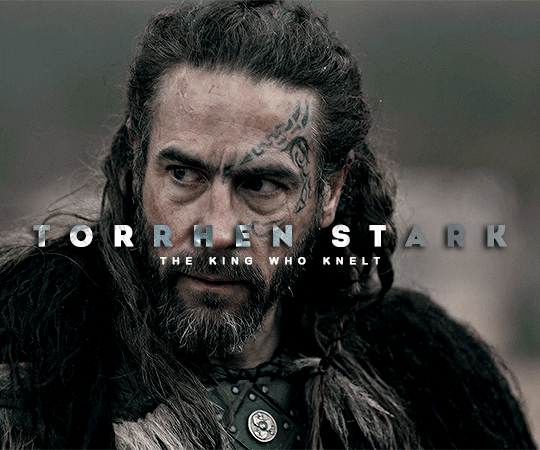
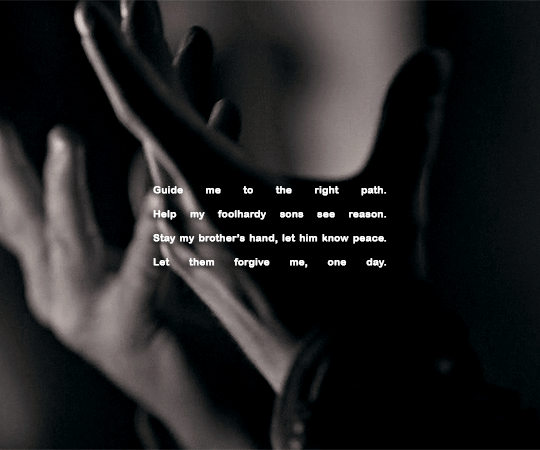


LORDS OF WINTERFELL + THEIR BASTARD SIBING - Torrhen Stark & Brandon Snow
To say that Torrhen Stark's decision to bend the knee to Aegon I was an unpopular one was an understatment. The king had ruled for nearly twenty years by that point and had maintained a rare tenure of peace and agricultural prosperity before the arrival of the Targaryen invaders. But while the decision to give up his crown may have saved the lives of the people of the North, it cost him the respect of his sons, his lords, and his brother, Brandon Snow.
Brandon was nearly a decade younger than the king, only just older than Torrhen's sons. The two had been close all their lives, as Brandon was raised within the royal Stark family amicably. He was trained as a warrior, one of the finest archers of the land. And he was bold, too. But like the rest of the North, Brandon held on to his grudges. It would be many months before Brandon spoke to Torrhen again after bending the knee to Aegon, and many more years before he considered forgiving his elder brother.
Torrhen prevented Brandon from trying to kill the dragons of Aegon, Rhaenys, and Visenya. Before departing Winterfell, Brandon carved three arrows. He prayed over them, willed the power of the Old Gods to guide them true and slay the beasts. But Torrhen forbade him from using them. They argued and raged at each other before finally Brandon agreed to treat with Aegon, but left his bow behind. By the next morning, Torrhen handed his crown to the conqueror and Brandon spat at his feet.
It was not that Torrhen did not believe his brother could accomplish his mission, and for many years after it haunted him that perhaps he should have let the boy try. But he knew that Brandon would die a martyr in the attempt. Perhaps it as his selfishness to not see his brother, and eventually his sons to die pointless deaths. In the attempt to find a peace, he lost his brother's respect, and his sons struggled to even look at him. Brandon lived in his rage; anger at Torrhen's cowardice, anger at himself for listening to him. But Brandon could not fathom a king's responsability to his country, and did not bear the weight of it. Perhaps Torrhen was preventing his brother from an inevitable failure that which he would be blamed for. The bastard that could not kill a dragon. He gladly kept Brandon's resentment for the rest of his life, if meant saving him that.
#a song of ice and fire#asoiafgif#asoiafedit#valyrianscrolls#torrhen stark#brandon snow#siblingsgifs#celebrating my freedom from shadowban hell with Ultra Niche Content#pls keep in mind that all of this above is my own narrative creative liberty#but i am truly obsessed with bran's vision of brandon carving the arrows?????#SAY MORE GEORGE#is there something special about weirwoods that would have made it possible to kill them?? what would have happened if he did kill them?#aegon still had the bigger army and likely would have defeated the north's forces#BUT this is the north so??????#maybe we should have let brandon do his thing a bit#wheres my stark history book george stop playing with me#i just want 1 detail#about any of them
458 notes
·
View notes
Text
When Liu Kang says "capture Shang Tsung"

and Bi-Han is "Decapitation then"
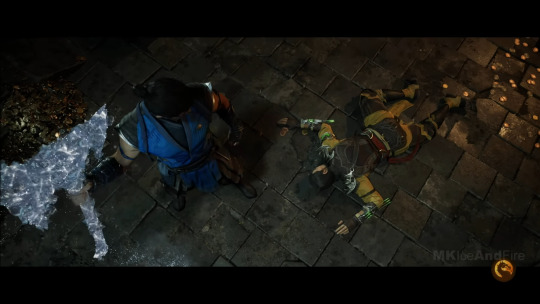
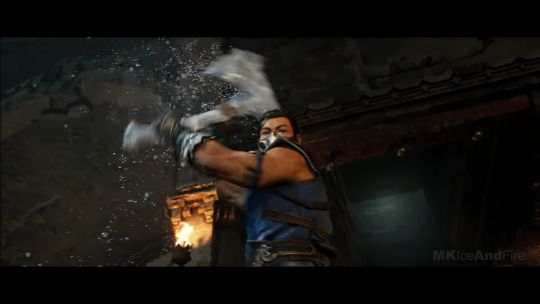

#mortal kombat#bi han#sub zero#shang tsung#liu kang#BI HAN WHY ARE YOU LIKE THAT? :D#i love him anyway but this is so hilarious detail#bi han... did you even listen to what the fire lord was saying at the war meeting?#liu kang wanted shang tsung alive not just his head#i'm so angry they didn't allow bi han do it#i know shang tsung must be alive and all but c'mon what a special force (assassin) wouldn't kill the target before enemy soldiers attack?#what a wasted scene!#shang tsung has more luck than common sense i guess#you don't use axe if you don't wanna cut the head or any other part of body right?#cryomancers are such savages :D
83 notes
·
View notes
Text
I'm about to do some REACHING are you ready
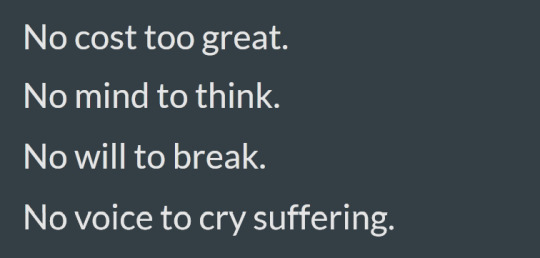


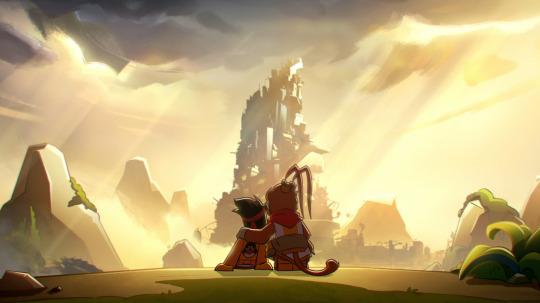

#Absolutely off my rocker and the circumstances of MK's birth could be so different and I could be extremely wrong#Do I honestly even understand hollow knight that well? Probably not.#BUT. But if I was right#Wouldn't this suck#Like if EAMK was real and MK was created to 'seal' away some chaotic cosmic force/to make said force a clean slate or whatever#Look look look look look#Mei and Azure have both been described as 'containers' for power.#Mei was a successful container to the Samadhi Fire#Azure was not a successful container to the Jade Emperor's power#And then there's whatever the fuck MK is. Like. The 1x01 seal I'm telling you#That's coming back (thank you 4x01 and the s4 special for using the same design when you really didn't have too!)#Look look look. Chaos starting because MK's seal broke (post realizing he had powers).#And like you know how the Hollow Knight became unsuitable for it's intended purpose because of their relationship with Wyrm#SO. MK's destiny/purpose being to cause chaos and ''unleashing'' MK being the thing to ''tip the universe into chaos''#But MK failing in that. Because of his relationship with Monkey King (and of course his friends)#This is all conjecture and reaching I know. I know.#BUT THINK ABOUT IT#WOULDN'T IT BE FUN#lmk#lego monkie kid#lmk crack#....yeah I'll tag it that#I feel that way posting this#lmk speculation#<- tag so I can find stuff for my s5 bingo card#hollow knight#hk#This is for me and like. 1 other person probably#You're welcome
58 notes
·
View notes
Text
This Is My 1,000+ Follower Special
Here I will answer any requests you may have. You can have as many as you want.
You can request
Smut
Fluff
Angst
...
Can't request
Incest
Pedophile
...
But do have fun giving me your request and I hope I can write them well.
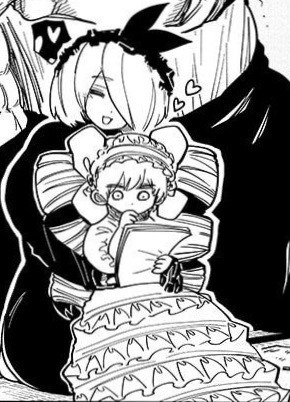
#request special#bnha x reader#demon slayer x reader#chainsaw man x reader#mashle x reader#genshin impact x reader#smut#bungou stray dogs x reader#black clover x reader#yozakura family x reader#undead unluck x reader#oshi no ko x reader#spy x family x reader#fire force x reader#soul eater x reader#twisted wonderland x reader#witch hat atelier x reader#tumblr writer#fanfic writing#fanfic writer#4kota x reader#seven deadly sins x reader
77 notes
·
View notes
Text
Benimaru Shinmon would love a black woman to I infinity I just know it
#tell me I’m wrong#actually all ff men are for black woman cause I said so#fire force#benimaru shinmon#benimaru x black reader#en en no shōbōtai#fire force anime#fire force manga#benimaru#shinmon benimaru#asakusa#company 7#special Fire Force company 7
109 notes
·
View notes
Text
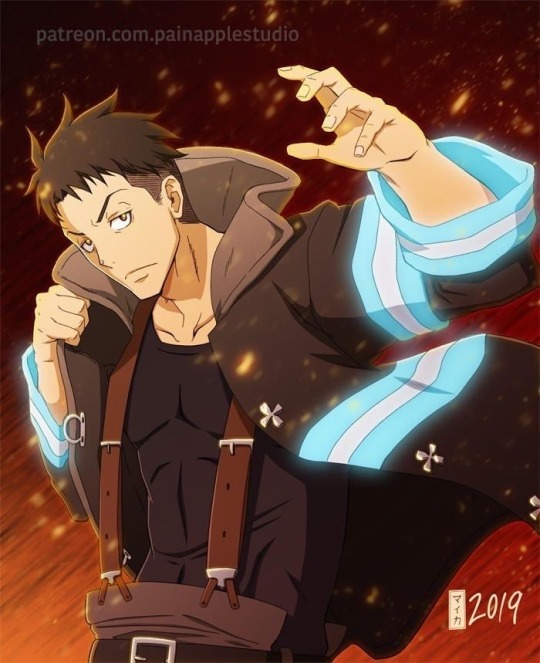
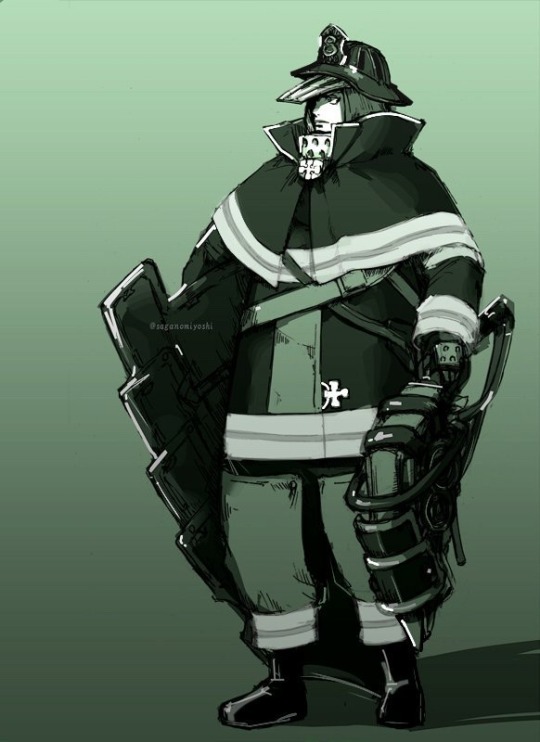

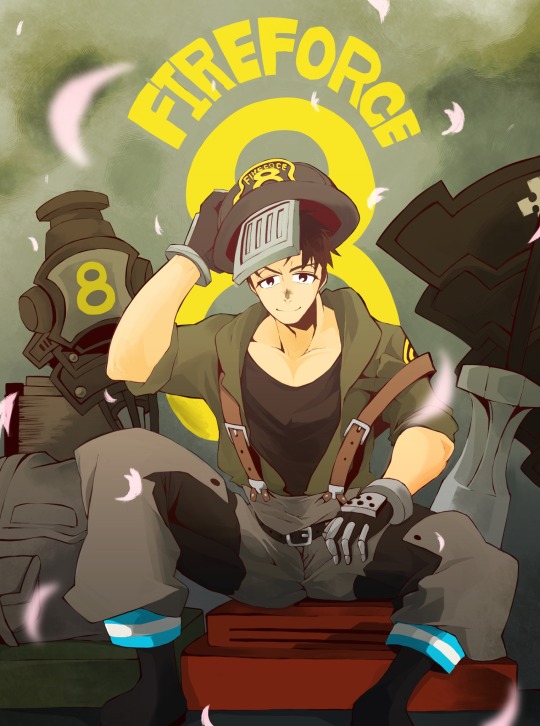

15 notes
·
View notes
Text
It's not that I mind my hyperfocuses I just wish they were a little less, you know, all-consuming
#there are things that have ended up a hyperfocus that I wish were a special interest instead#love having special interests they're a comfort#hyperfocuses are more like a barrel of ants tipped into my brain#i go moderately insane#a hyperfocus broken by outside forces? actual fucking worst#the ants are now on fire and there's at least a handful who start spitting acid
34 notes
·
View notes
Text
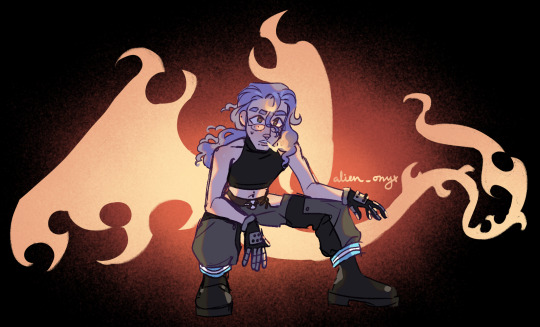
little dragon :3
lore in tags, trivia under cut
Name: Onyx Amadeus Blackwood, but everyone just calls me Onyx!
Affiliation: Special Fire Force Company 0
Rank: Fire Soldier, 1st class
Ability: moonfire dragon (3rd generation)
Height: smallest man you'll meet (5ft)
Weight: throwable
Age:21
Birthday:23rd August
Sign: Virgo
Blood Type: O-
Nickname:little dragon
Self-Proclaimed:Helper!
Favourite Foods:savory and sweet foods, especially chicken wings
Least Favourite Food: beans
Favourite Music:punk rock!
Favourite Animal:kitty
Favourite Colour:black
Type: a big older man
Respects: his colleagues
Has Trouble Around / Hates: Wah I don't know :S
Who They're Afraid Of: some big older men…
Hobbies: anything to do with outside! and reading
Daily Routine: check which Company I've got to help out on that day, check what else I have to do, and such
Dream: for everyone else's dreams to come true :3
Eyesight: pretty good! the glasses are just to see perfectly during deployments
Favourite Subject: none
Least Favourite Subject: Actually, I never really went to school consistently..
#fire force#fire force oc#digital art#art#oc art#I made up a special fire force company 0 consisting only of soldiers of the first rank who are sent to other companies to assist#due to this he gets tossed around quite a bit#he's really just a helpful cheerful little guy#whos also a huge people pleaser#but he can really kick ass
4 notes
·
View notes
Text
Treat Your S(h)elf: Gates of Fire by Steven Pressfield (1998)
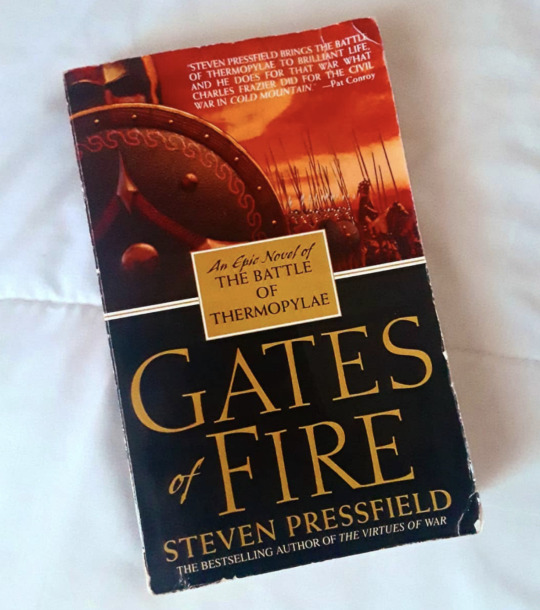
At Thermopylae, a rocky mountain pass in northern Greece, the feared and admired Spartan soldiers stood three hundred strong. Theirs was a suicide mission, to hold the pass against the invading millions of the mighty Persian army.
Day after bloody day they withstood the terrible onslaught, buying time for the Greeks to rally their forces. Born into a cult of spiritual courage, physical endurance, and unmatched battle skill, the Spartans would be remembered for the greatest military stand in history–one that would not end until the rocks were awash with blood, leaving only one gravely injured Spartan squire to tell the tale….
- Steven Pressfield, Gates of Fire (1998)
This is one of my favourite books on war I’ve ever read. I took my dog-eared copy with me last year when I went with ex-military veterans friends to climb Olympus and hike around Greece. One of the places we stopped was Thermopylae - where you can still bathe in the hot springs as the ancient Spartans and Athenians did before their monumental battle with the Persians. The very recent death of the last king of Greece, King Constantine II of the Hellenes, made me think of my trip to Greece last year and of one of the books I read on that trip. I thought I might share some of my rambling thoughts I had written down at the time, and also since then, about the retelling of one historical turning point in our western civilisation that has now entered into myth.
In 1998 was the year Frank Miller’s iconic comic graphic novel 300 about the the Battle of Thermopylae – where a tiny Greek force led by 300 Spartans held out for three days against an immense Persian invasion in 480BC - was published to great critical acclaim. Zack Snyder highly stylised slick film version of Miller’s 300 defied audience and studio expectations when it stormed the box office with Spartan-like ferocity back in 2007. Its mix of ancient history, comic-book iconography and sound-bite dialogue immediately found its way into the verbal and visual lexicon of contemporary pop culture; but things could have been very different. In 1998 Miller’s publication overshadowed the publication of Steven Pressfield’s more conventional historical novel, Gates of Fire, took its name from the eponymous battlefield, Thermopylae (referred to in 300 as ‘the hot gates’).
Pressfield, an ex-Marine soldier, had worked as a screenwriter creating disposable action-movie scripts for the likes of Steven Seagal and Dolph Lundgren in the late 1980s and early 1990s before writing his first novel, The Legend of Bagger Vance, which was adapted into the Will Smith film of the same name. It too won critical acclaim and was a huge best seller. George Clooney’s film production company bought the rights and David Self (screenwriter of 13 Days and Road to Perdition) was brought in to adapt it. Bruce Willis was dying to be in it and iconic director Michael Mann signed on the direct it. Instead the film went into development hell before Snyder’s film stole a march on Mann’s version to come out first in 2007.
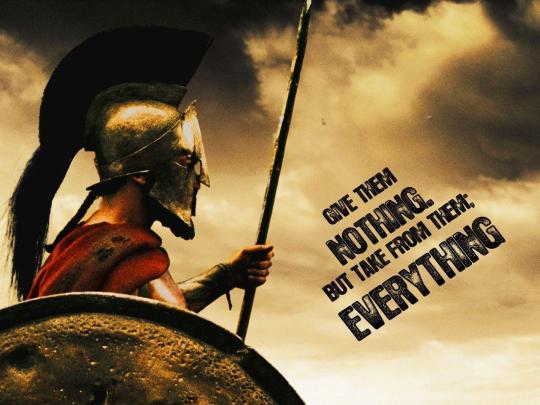
As a Classicist and ex-veteran I found Both Miller’s comic graphic novel and Snyder’s film a severe guilty pleasure. But I have to say I found reading Steven Pressfield’s brilliant novel deeply satisfying on many more levels.
The book I remember well as an American special forces chap I knew out in Afghanistan gave it to me to read because I was complaining I was fast running out of things to read between missions. I loved it.
Like a good officer I passed the book along to others in my corps - rank and file - and within a month or two it had been passed around a fair bit. It led to endless arguments about the Greeks and the Western way of war in and out of the cockpit with my brother/sister aviators and crew as well other officers and the men.
For the soldiers on the ground the book felt more visceral. As a fellow brother British infantry officer said the depictions of phalanx warfare raised his blood pressure at how well he and his men could relate. I never felt more Spartan than I did I sitting on my arse baking in the sun of Afghan red dust mornings. We all related to this story one way or another - the sand, sweat, blood, feelings of combat, and thoughts of mortality.
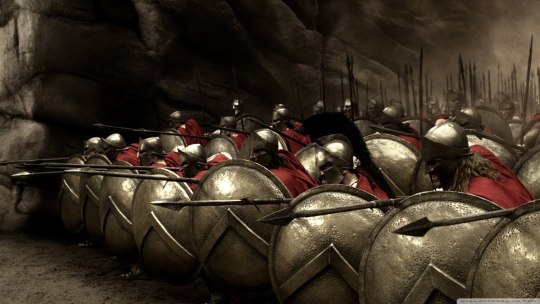
Most book reviewers loved the book. “Does for (Thermopylae) what Charles Frazier did for the Civil War in Cold Mountain’, enthused author Pat Conroy. The New York Times praised the book’s ‘feel of authenticity from beginning to end.’ Author Nelson DeMille admired the ‘mastery, authority and psychological insight.’ Sarah Broadhurst, in The Bookseller, particularly wanted to recommend the book to women: “ Although it has a male feel to it, it will appeal to both sexes, as my two readers and I can testify. In fact, it is a great example of the rebirth of the historical novel, which I am sure is on its way.” Where people quibbled, it was usually about the violence of some of the descriptions, or on small errors of fact. The Times called it ‘a story of blood, biffing and bonking, thigh deep in blood, terror-piss and entrails’ but acknowledged that ‘their heroism still makes the hairs at the back of the neck bristle’. The Times Literary Supplement sniped at Pressfield for confusing two different Greek cities called Argos, and for what it called ‘phallocentric discourse’, but also called the book ‘a monument to the important twentieth-century art of pace.’
The novel stands out in the way it makes everything come alive from the soldiers' training, the scenes of actual battle, and most particularly the scenes after or between battles. The discussions of fear, and of how officers and soldiers should behave are particularly poignant and also felt very real to those of us who have experienced war first hand. What I found pleasantly surprising was how well written it was with its very strong portrayals of women as secondary characters. With nearly all military books women are often relegated to the background but here I found some of the strongest depictions of women in this genre. The women don't fight in the battles, yet are courageous and compassionate, intelligent and influential.
Many readers will be familiar with the broad strokes of the story of the battle. But it’s worth recapping here for those that don’t. In 480 BC, King Xerxes lead a Persian army of between one and two million into Greece. The Spartan King Leonidas lead 300 Knights and some 700 Thespaian allies to the narrow pass at Thermopylae, in order to hold the Persians back as long as possible. They proceeded to hold the pass for 7 days. These 300 Spartans died to a man defending the pass against a force of over a million and the epitaph provided to them by the poet Simonides, "Go tell the Spartans, stranger passing by, that here obedient to their laws we lie", is perhaps the most famous in history. Their example rallied and inspired all of Greece and eventually the Persians were defeated in the naval battle at Salamis and on land at Plataea.
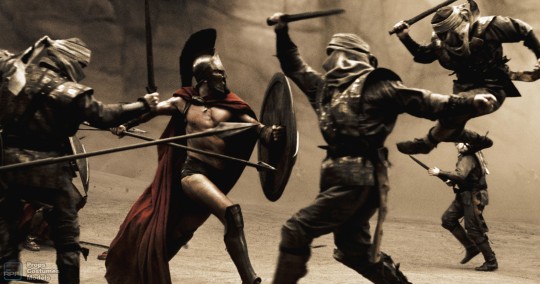
The story is told from the point of view of its narrator Xeones of Astakos, a helot, a slave of the Spartans, and has his own conflicted feelings about Spartan society. He is taken, wounded, before Xerxes, and asked to explain “who were these foemen, who had taken with them to the house of the dead ten or, as some reports said, as many as twenty for every one of their own fallen?” In Xeones’ own words, therefore, we get the story of his life; from when his own city is destroyed, to when he comes to Sparta as a slave, to the time when he finally comes to stand beside the Spartiate in the fateful battle. As the sole survivor among the Spartans, Xerxes wishes Xeones to tell his story to the Persian court historian Gobartes. Xeones starts with the tale of how he came to Sparta. As a youth, his village of Astakos is destroyed and his family slaughtered, but he and the cousin he loves, Diomache, escape. As they wander the countryside, Diomache is raped by soldiers and Xeones is crucified after stealing a chicken, although Diomache saves him from death. Thrown into despair, because his hands are so damaged that he can never wield a sword, Xeones heads off by himself to die. But he experiences a visitation from the Archer god Apollo Far Striker and realizes he can still wield a bow. When Diomache, who is also distraught after being violated by the soldiers, takes off, Xeones heads to Sparta where he hopes to join the army.
The middle section of the book, which is at a much slower pace, deals with his life in Sparta and the training techniques used by the Spartans to create what was one of the most formidable fighting forces the world has ever seen. Eventually he becomes the squire of one of the 300 knights who are chosen for Thermopylae.
The final section, on the battle itself, depicts wholesale slaughter accompanied by acts of ineffable courage. It also relates two of the great lines of all time. When Xerxes offers to spare the Spartans lives if they will surrender their arms, Leonidas is reputed to have snarled, "come and get them." And upon being told that the Persians have so many bowmen that the cloud of arrows would blot out the sun, one of the Spartans says, "good, then we'll have our battle in the shade."
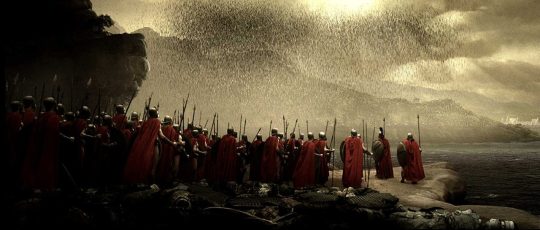
Pressfield being an ex-Marine grunt himself gives a very convincing grunt’s-eye-view of the battle and of Spartan society to create a fantastically blood pumping engaging tale. Pressfield sets himself the task of explaining Spartan culture to us in all its glory, humour, brutality and philosophy. To do so, he draws on his personal experience as a US infantryman, as well being strongly versed in Classics. The result is a fascinating tale, on one level a war story written with great pace and excitement, on another a ruminative tale of man’s capacity for honour, heroism, and self-sacrifice.
As a Classicist (since confirmed by Pressfield in many interviews) he makes excellent use of the ancient historical sources (such as they are). The most useful sources seem to be Herodotus first, his pages about the battle. Plutarch’s Lives of various Spartans — Lycurgus, Agesilaus, Lysander, etc - can be discerned strongly as the section of his Moralia called Sayings of the Spartans and Sayings of the Spartan Women. Xenophon of course was the best contemporaneous eyewitness to real Spartan society. Constitution of the Lacedaemonians, the Cyropaedia and even the Anabasis greatly help Pressfield pepper history with authentic detail. Diodorus’ version of the battle added the thought of the night raid (which The 300 Spartans also had) and Pressfield takes that from him. Pressfield has said that he didn’t consult recent archaeology, other than going to Sparta myself and checking out the ruins of Artemis, Orthia and so forth.
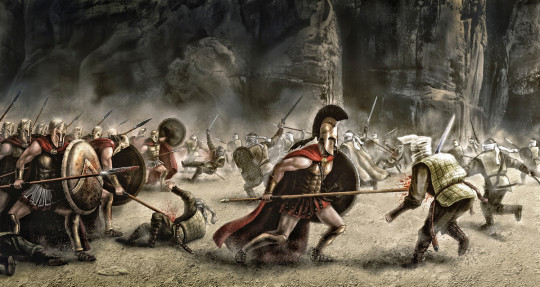
But still huge gaps remained. This is where Pressfield the ex-Marine and the well educated novelist come together. There was much detail that he needed to consciously to make up and make it sound plausible and even true. For instance, the concept of phobologia, the Science of Fear. That’s completely invented, yet Pressfield, as a Marine veteran, absolutely felt certain the Spartans, like every other warrior race, must have had something like that, a religious-philosophical doctrine of warfare understanding the principles of their culture, probably a sort of cult-like initiatory situation.
Pressfield in one interview admitted that the speech that Alexandros recites holding his shield — “This is my shield, I bear it before me into battle, etc.” — was a fictional invention based upon his own experience in the US Marine Corps, where Marines recite, “This is my rifle. There are many other like it, but this one is mine, etc.” Another huge fictional detail that he made central to the story was the prominence of the squire in hoplite battle. Again he based this on pure instinct and common sense. He thought the relationship must be much like that of a professional golfer to his caddie. Pressfield firms believes that the bonds formed between man and batman in the course of bloody warfare must have been intimate on a level second only to husband and wife, and maybe more intimate. The ancient sources make nothing of this, because they just passed it over as obvious, but I fully agree with Pressman. It’s an inspired insight. The fact that squires and armour bearers voluntarily stayed to die at Thermopylae says volumes. (Also a squire was the perfect fly-on-the-wall narrator, like Midshipman Byam in Mutiny on the Bounty.) Further I could not imagine that squires would stand idly by, watching their men fight. They must have served as auxiliaries, not only dashing in and out of the field evacuating the wounded, but getting in their blows as light infantrymen whenever they could. I suspect that, as prominent as Pressfield made their roles in Gates, if we could beam ourselves back and witness actual ancient battle, the part of the squire/auxiliary was even bigger than one might imagine.

The book then is not merely about the immortal stand at Thermopylae but delves into the Spartan lifestyle, how they achieved such military cohesion, how they viewed themselves and the world, what made them willing to march off to a suicide mission — it’s one thing to find oneself in such a situation, it’s quite another to jockey to be chosen for it, to know days ahead of time that this is it, you’re heading to your death and to do it unflinchingly. It’s about what binds men together in a group — what makes them willing to die for others. I think Dienekes’ thoughtful analysis of fear and how the opposite of fear isn’t bravery but love, tells it all. Love of a messmate, a family, a city.
Indeed as Pressfield shows the spartans would carry their shields on the left side of their body which allowed them to cover the blind spot of the warrior fighting next to them. Commanders would arrange it so that family members and friends were placed next to each other within the formation. The belief was that warriors would be less likely to abandon their comrades if they were fighting next to someone they deeply cared about. Love conquers fear.
Now the story isn’t perfect, there are some pacing issues when the plot seems to go extra slow, and there are time jumps that can feel a bit awkward. Some periods of our main protagonist’s life, that would be interesting, are just skipped.
In my opinion, the book balances fiction and facts quite nicely, not making the Spartans some over the top super heroes, like the movie “300” did.
The thing that I liked the most is the whole theme of the book: honour, the duty to your city and people, and the strength of the mind. The Spartans didn’t see war as a fun way of killing people, it was an inevitable fact of life. They didn’t kill fear, they learned to embrace it, keep it locked until the very last moment.
Now it’s a bit harder to judge characters in a book like this because some of them are based on real people and some of them are fictional. But what I will say is that these people feel real, grounded to the situation they are in.
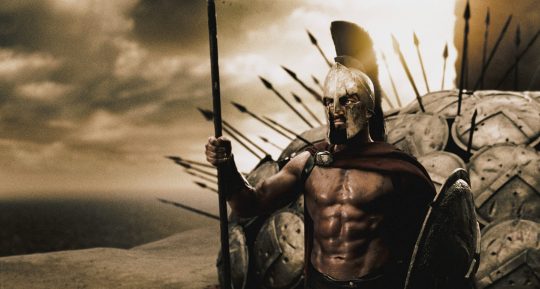
I was very taken by the portrayal of Leonidas, the Spartan king who commanded at Thermopylae. One of the most stirring speeches in the book is addressed to Xerxes, the King of Persia, and contrasts Xerxes with Leonidas: "I will tell His Majesty what a king is. A king does not abide within his tent while his men bleed and die upon the field. A king does not dine while his men go hungry, nor sleep when they stand at watch upon the wall. A king does not command his men's loyalty through fear nor purchase it with gold; he earns their love by the sweat of his back and the pains he endures for their sake….”
I also appreciated the inclusion of the women of Sparta — no shirkers themselves. They would be the first ones out shaming the men into doing their duty for their city (and that’s what it was all about for these people — the survival of the city first) if that was what was needed. I have to say I shed a tear when Leonidas confessed his criteria for selection of the 300. So much is said about Spartan men but the women kicked ass in a time and place where women were almost never seen and certainly never heard from. The first female Olympic champion was a Spartan princess called Kynisca, in 392 BC. She was also the first woman to become a champion horse trainer when her horses and chariot competed and won in the Ancient Olympic Games. Twice.
Arete is in some ways the most powerful character in the book. She is very well written. She just popped forth, full-grown from the brow of Zeus. I liked her a lot. Whether or not Sparta was a “good” place for women I can’t say. Certainly it would be fascinating as hell to beam back there and see, for real, how they lived and what they were like. It seems likely Pressfield drew inspiration of Arete from Plutarch’s Sayings of the Spartan Women. These, if you’ve ever read them, are unbelievably hard-core. For example, here’s one: A messenger returns from a battle to inform a Spartan mother (Plutarch gives her name but I’ve forgotten it) that all five of her sons have just perished honourably fighting the enemy. She asks this only: “Were we victorious?” The courier replies yes. “Then I am happy,” says the mother and turns for home. Here’s another: A messenger returns from another battle to tell another mother that one of her sons has been killed, facing the enemy. “He is my son,” she says. Her other son, the messenger continues, is still alive but ran from the enemy. “He is not my son,” she replies. Pressfield doesn’t see Arete quite that hard-core but certainly someone tough as nails who imbibed the Spartan mythos even more than the men and lived it. Pressfield admits in one of his interviews that this was all instinct, he could be wrong, but itt just was what felt right to him.

Before I had gone through Sandhurst after university I didn’t really condone crude language or lewd humour but it’s one of the ways that my stint in the army and especially out on a battlefield deployment changed me a little. I confess that I loved the sometimes crude humour - they’re soldiers in a time of war and you do or say whatever will get you through. Battle (especially foxhole) humour has a dark gallows feel and it’s entirely acceptable and authentic - just ask any veteran of any war. The battle descriptions are graphic - very graphic but not much worse than what’s in the Iliad. And we are talking about a battle in which thousands died by sword, spear, arrow and other various messy methods.
I also enjoyed how the book has a pleasing prose aesthetic that imitates the style of Homer. For the non-Classicist it may take a little bit of getting used to and slow down their reading but it sounds melodious to the ear.
Overall Pressman gives us a pulsating story in which the characters are not either super evil villains that cartoonishly want to “take over the world” or superheroes that can’t make mistakes. The author doesn’t take a side in this story, war is war, and people are people. They make mistakes, get angry or jealous, they do bad things in the name of good and vice versa. The book is not about good and evil, it’s about how different people and cultures understand the order, stability, good and even our minds and dreams. The enemies here aren’t some sort of Oriental magic freaks from far away lands, they are just men made in flesh and blood. Sure wanting to control more land or have more people serving them, but that’s everyone I know in the history of rise and fall of civilisations.
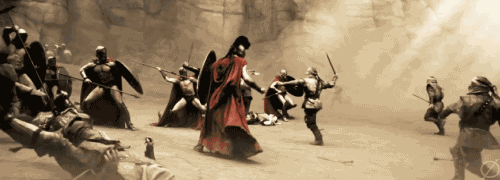
Was the Spartan defence of the Hot Gates worth it?
Clearly, yes. Cultures, if not civilisations, are nearly always rubbing up against each other and even clashing where they can’t bridge differences. I think Pressfield has it right when he said, “What the defence meant to me was this: its significance was metaphorical rather than literal. We are all in a battle that will end with our deaths and, like the Spartans at Thermopylae, we know it. The question is how do we deal with it. They answered by being true to their calling, to their brothers and sisters, and to their ideals. Early in the book there’s a passage where the Persian historian is narrating; he’s speaking of King Xerxes and his interest in the fallen Spartans. Xerxes says of them: “He knew they feared death, as all men. By what philosophy did their minds embrace it?”
In two of my favourite passages, Pressfield has his protagonist explain why sacrifice is so beautiful to the Greeks (or to anyone who has honour), "In one way only have the gods permitted mortals to surpass them. Man may give that which the gods cannot, all he possesses, his life”. This is a very profoundly moving insight.
Pressfield goes further and tries to answer a much deeper question as to why men fight and perhaps this is where it’s the ex-Marine and not the novelist in Pressfield who is talking, "Forget country. Forget king. Forget wife and children and freedom. Forget every concept, however noble, that you imagine you fight for here today. Act for this alone: for the man who stands at your shoulder."
Amen to that.
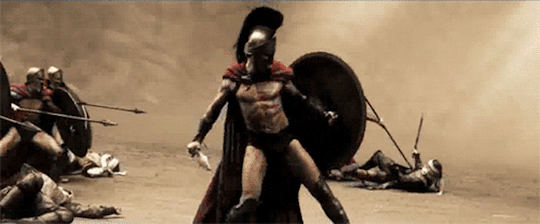
At the end of the book, I would have probably stranded there fighting side by side with them against the Persians. Because at that point, they were my friends, comrades, and heroes. It was when I put the book down that I realised that I already had the humble privilege of serving with my fellow brother and sister officers and soldiers of whom all were comrades, many were friends, and a few were unspoken heroes.
Does the battle of Thermopylae provide any lessons to us?
That is harder to discern because it depends on what values we already hold dear. Sparta was a small, compact, basically tribal society where every citizen (forgetting about the helots for the time being) was vitally needed and where warfare was hand-to-hand and absolutely communal, with your own brothers, uncles, father and friends fighting beside you, so if you acted the coward, there was no hiding it. The modern world of anonymity, mass culture, commercialism, shamelessness, indulgence of sensual desires, worship of money couldn’t be farther. The Spartan society is like a culture from the moon.
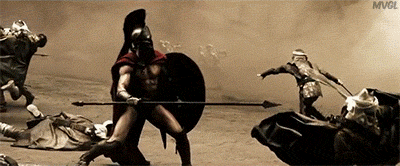
On an individual and interior basis, I think, can we take lessons that might help us. Self-discipline, loyalty, grit, hard work, perseverance, honour, humility, respect, and compassion.
On a societal level Spartans were not selfish and didn’t worship the cult of individualism as we do today. It was all about the group. In our age when civil strife, economic hardship, and effects of a unrelenting pandemic erode our trust in our political and civil institutions and set neighbour against neighbour because of the political or religious beliefs they might hold, the only thing we have left to fall back on is just our individual selves. It’s every man for himself. The Spartans would balk at such selfish individualism. The strength (and ultimately the effectiveness) of the Spartan phalanx was encapsulated in the “next man up” approach. If a warrior was injured or killed on the outer edge of the formation, the next man behind them would step up and take their place. The integrity of the group’s formation was protected at all costs, because without the strength of the phalanx to protect them, each man on had little chance of surviving the battle on his own. In a real sense, they had each other’s backs. They had the cohesion of a collective spirit. They were in it for each other together.
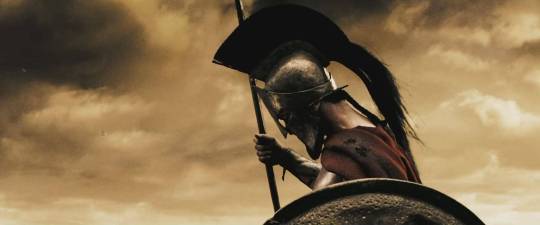
It’s not a bad thing in this day and age to be a little bit “spartan,” don’t you think?
#treat your s(h)elf#book#review#book review#reading#gates of fire#steven pressfield#sparta#thermopylae#persia#leonidas#xerxes#society#culture#antiquity#classical#greece#war#warfare#special forces#british army#US marines#battle#soldiers#arete#women#afghanistan#civilisation#TYS
45 notes
·
View notes
Text
I think I'd play post-5D's Yu-Gi-Oh! a lot more if there was something like Over the Nexus for it
#yu-gi-oh!#world championship 2011: over the nexus#legit i wanna play dragon rulers and fire fists and true draco and put scarlight red dragon archfiend in every deck#but after over the nexus they just kinda gave up#the closest thing i can think of would be arc v tag force special#but that's japan only and idk if there's been a good english patch yet
6 notes
·
View notes
Text

Arthur Boyle (Work in Progress)
#arthur#boyle#knight king#company 8#special fire force#fire force#enen no shouboutai#vector#WIP#workinprogress
3 notes
·
View notes
Text
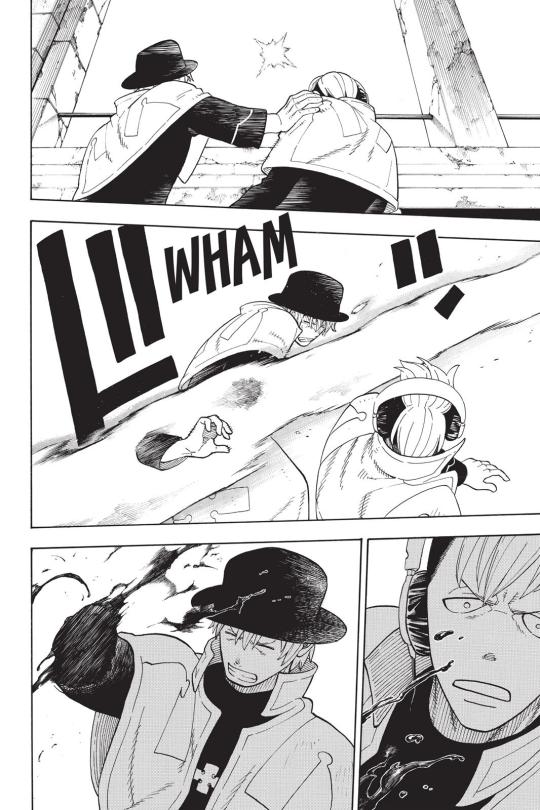
9 notes
·
View notes
Text
Some man, different flavor


12 notes
·
View notes
Text

Something I’ve been working on bc I just want them to be happy 🥺🥺 Fire Force animation is *chef’s kiss* could do without the unnecessary fan service tho… this piece isnt done yet btw :)
#fire force#art#artists on tumblr#digital art#fan art#sho kusakabe#shinra kusakabe#fire force fanart#special fire force company 8#the evangelist#anime#anime art#anime fanart
48 notes
·
View notes
Text
You see Jackie is great because she has a similar appeal to me as Maxwell but she's a lesbian and also not british so she's automatically a billion times better and more interesting
#rat rambles#oni posting#starve posting#theyre very different people fundementally but the core appeal of watching a shitty guy dig themselves into deeper and deeper holes remains#bro if they met itd make maxwell so pissy he would not be ok with having someone talk down at him like jackie would#bro jackie would at best be patronizing as hell she would see him as the dirt beneath her shoes#she would not be impressed by his magic tricks at best shed be intrigued by the science behind it but she would not think hes special#now to be clear. jackie is just as pathetic as he is and would 100% die so fast in the constant#like shed get attacked by nightmare creatures so fast and if she survived that a hound would probably maul her#I do hc that at least in the past jackie was decently physically fit but even back then she was like ripped and I think if she tried to#punch something shed miss pathetically and fall over and break all of her bones#olivia is a similar case but shes more fit and probably could barely brute force her way through a few hound waves#the real difference is that olivia would be quicker to adapt and would put up a much better effort at preparing the essentials#now. she would get side tracked as hell by the wildlife. I think if you showed her a carat shed stare at it forever.#but jackie would struggle so hard to adapt and I think the isolation would get to her hard#if you put them together itd just be olivia hard carrying while jackie trips and eats shit every 10 steps#now putting them with the rest of the survivors would be interesting given that I think the two would hate most of them dhdkhdj#like I have no proof that olivia wouldnt like most of them but idk man I dont trust her to not be quietly judging them all#and jackie would probably explode if she was forced to interact with other human beings in a non boss-employee setting#olivia would start calling her jackie again and the others would start calling her that too and shed light herself on fire#wilson would start trying to be buddy buddy with the two and theyd both hate him so fucking much lol#the two would start trying to blueprint machines they could build with what they have and winona would enter frame about to ruin their day#you see winona is like their dark reflection shes like if you took a lesbian and made her the worst but not a bad person this time#shed start critiquing their work for being to fancy and theyd want to strangle her#and god knows how theyd handle the kids I think jackie would have a panic attack and olivia would go smash her head into a tree#and by the kids I mostly mean walter he was hand made to annoy them specifically#oh no wait hypothetical crossover cancelled I forgot abt wanda dont Ever let jackie and olivia meet wanda
2 notes
·
View notes